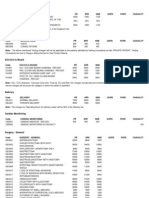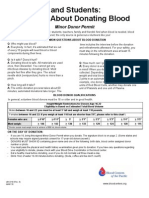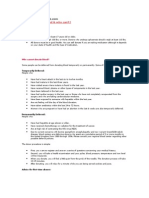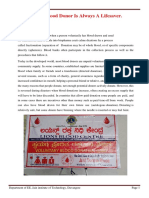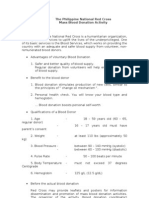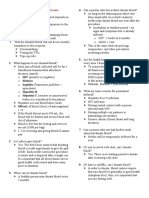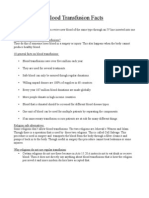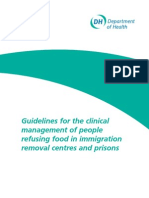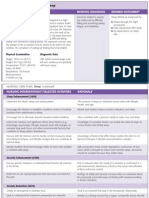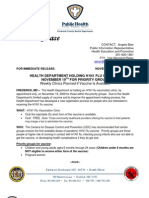0 ratings0% found this document useful (0 votes)
14 views20 Questions About Giving Blood: Donation Process
20 Questions About Giving Blood: Donation Process
Uploaded by
Maria BonitoMen and women can donate blood every 3-4 months without harm. The donation process takes about 30 minutes and involves answering questions, providing identification, and having a light meal before donating about 450ml of blood. All materials used in the donation process are sterile and disposable to ensure donor safety.
Copyright:
© All Rights Reserved
Available Formats
Download as PDF, TXT or read online from Scribd
20 Questions About Giving Blood: Donation Process
20 Questions About Giving Blood: Donation Process
Uploaded by
Maria Bonito0 ratings0% found this document useful (0 votes)
14 views2 pagesMen and women can donate blood every 3-4 months without harm. The donation process takes about 30 minutes and involves answering questions, providing identification, and having a light meal before donating about 450ml of blood. All materials used in the donation process are sterile and disposable to ensure donor safety.
Original Title
Folheto Informativo Ingles
Copyright
© © All Rights Reserved
Available Formats
PDF, TXT or read online from Scribd
Share this document
Did you find this document useful?
Is this content inappropriate?
Men and women can donate blood every 3-4 months without harm. The donation process takes about 30 minutes and involves answering questions, providing identification, and having a light meal before donating about 450ml of blood. All materials used in the donation process are sterile and disposable to ensure donor safety.
Copyright:
© All Rights Reserved
Available Formats
Download as PDF, TXT or read online from Scribd
Download as pdf or txt
0 ratings0% found this document useful (0 votes)
14 views2 pages20 Questions About Giving Blood: Donation Process
20 Questions About Giving Blood: Donation Process
Uploaded by
Maria BonitoMen and women can donate blood every 3-4 months without harm. The donation process takes about 30 minutes and involves answering questions, providing identification, and having a light meal before donating about 450ml of blood. All materials used in the donation process are sterile and disposable to ensure donor safety.
Copyright:
© All Rights Reserved
Available Formats
Download as PDF, TXT or read online from Scribd
Download as pdf or txt
You are on page 1of 2
Men can give blood every 3 months (4
times/year) and women every 4 months
Donation Process
20 QUESTIONS
(3 times/year) without this causing any The donation process takes around 30
problems to themselves. A total unit of
blood is about 450ml. Every person has
minutes. We would like to remind you
that you should not give blood without
ABOUT GIVING
eating (fasting).
around 5-6 liters of blood in circulation,
depending on their body surface.
You may eat a light meal/snack without
alcohol and that isn’t fatty, such as a
BLOOD
The blood you donate is rapidly sandwich and a soft drink/juice. If you
replaced by your body. It is not possible have lunch, you should wait the 3 hours
to contract any illness when donating after digestion before donating.
blood, as all the materials used are When you arrive at any regional Blood
sterile, disposable and used only once. Bank or hospital with a blood donation
service, you will be seen by the
You can give blood if you are in good administrative personnel who will fill in
health, have a healthy life-style, weight your form.
50kg or more and are aged between 18 It is important that you bring your ID
and 65 years. card or “cartão do cidadão” in order for
For a first donation, the limit of age is your personal details to be filled in
correctly and later you will receive your
60 years.
National Blood Donor card.
The Blood Bank (Transfusional
Medicine Services) takes blood from
donors:
Monday to Friday from 8:30am to
1:00pm
Saturdays from 8:30am to
12:30pm.
PRIOR DONATION SCHEDULE
Monday to Friday from
8:30am to 3:00pm
Contact: 291 705 752
email:dadoresmadeira@sesaram.pt
Mod.21.PC01_02
9- I gave my blood willingly, but I think it’s being sold 16- I was pressured to give blood and I am not willing to
1- No one has ever asked me to give blood to patients. do it again.
Consider yourself invited. This silent invitation is not It is strictly prohibited to sell or commercialize blood. No one has an obligation to give blood. Donating blood
formal, it’s real: it’s directed by all children and adults Only expenses in relation to the blood preparation, this is a free and voluntary act of people who are used to
that need blood or it’s components, by all the victims of is, the costs associated with laboratory, materials and thinking of others. However, don’t forget, that many
work and road traffic accidents, by all those that are examinations in order for transfusions to occur with the people need the blood that only you can give, because
awaiting blood availability in order to have their highest safety, can be charged. you are healthy.
operations, and for this reason, are occupying a bed that
many others need. 10- I am worried that I may feel weak after giving blood. 17- If I need blood, I will go to a private service and pay
450ml is the amount of blood taken when you donate for all the costs involved.
2- My blood is probably no good as I have had several blood. The proteins and blood cells that are in this You may have all the money needed to pay for all the
illnesses. volume are quickly renewed by the body’s circulation. blood in the world, but you should never forget that you
Your question should be answered by your GP/ Moments after your donation anyone can return to cannot transfuse money. Even in these cases, someone
attending doctor. But, you could simply offer to donate normal daily life. has had to donate some of their blood in order for you to
your blood, as you will be submitted to a clinical However, some professionals, such as, aircraft pilots, to benefit from it.
examination, during which the doctor will advise you of divers, should not work for a few hours after donating Without the blood, your money is worthless. In fact, for
the correct procedures, always taking into account blood. all to go well and there be no risks associated, it should
what’s best for your health and well-being. Trust the be the blood waiting for the patient and not the other way
blood bank services and their doctors. 11- There are already many people giving blood. round.
It’s true, but the need for blood and it’s components
3- Do I need the blood I donate. does not stop growing. Thanks to advances in medical 18- My blood is no good.
In a normal adult there is between 5-6 liters of blood. A science and the growing benefits of delivering a service A sample of your blood will be analyzed. If any
healthy person may donate blood regularly, and this will with better quality, we need more donors, who, like you, abnormalities are detected, you will be informed and
not harm their health. are in good health and have a healthy lifestyle, so that guided about what you need to do.
we can attend to the therapeutically needs of patients.
4- My type of blood is not the one needed the most. 19- It’s not very convenient for me to give blood.
All blood types are necessary, even those that are not 12- I never thought my blood would be needed. You can choose the day and time that best suits you.
the rarest. You only need to remember that you may also Of course it is. Every minute blood is needed in all
need blood one day. Imagine that everyone with the hospitals to across our country. Make the decision now! 20- I will only give blood if someone needs it
same blood group as you thought like this. That someone may be a member of your family that is
13- I don’t know how or where to give blood. very dear to you, and you are not even be aware of what
5- Honestly… I’m scared to give blood. Very easily done: go to your nearest hospital. Your visit is going on. In fact, in catastrophic situations, usually
A large number of people think like this, when they are is always welcome and you will be given all the there is no shortage of blood.
giving blood for the first time. But after, they lose their information you wish. The real shortage happens every day, without media
fear and giving blood becomes natural and simple. attention; it is the reality of the blood bank service.
14- I don’t have time. Problems arise when it is the patient who has to wait for
6- I’m not old enough to donate blood. If for one second you stop to think about the good that the blood and not the blood that is waiting for the patient.
Any healthy person, aged between 18 and 65 years you are doing by donating your blood, quickly you will
can give blood without any problem. realize that this is not a good enough reason: surely you
are not as busy as you think.
7- I don’t weight a lot.
Any person that weights more than 50kg can donate 15- I am afraid I will be turned down as a donor.
blood. If you are healthy, there is no reason not to try. There
are several reasons why you may not be able to give
8- I have already donated blood this year. blood or be put “on hold”. If this happens temporarily,
Well done, but you can donate again without this come back and try once your doctor gives you the go
causing any inconvenience to your health or wellbeing. ahead.
Anyone can donate blood several times a year (men
every 3 months, women every 4 months). This
information is evidence based.
You might also like
- Sample Persuasive Speech Outline Monroe - S Motivated SequenceDocument4 pagesSample Persuasive Speech Outline Monroe - S Motivated SequenceMuhammad Imran100% (7)
- Sample Persuasive Speech Outline Monroes Motivated SequenceDocument5 pagesSample Persuasive Speech Outline Monroes Motivated SequenceClarice Elisha100% (6)
- Speech Outline - BloodDocument3 pagesSpeech Outline - BloodDavid Alexander Niño80% (5)
- Holy Family Hospital Rate CardDocument37 pagesHoly Family Hospital Rate CardSwami Nathan70% (10)
- PR Blood DonationDocument24 pagesPR Blood DonationVipul PartapNo ratings yet
- Blood DonationDocument24 pagesBlood DonationKris NNo ratings yet
- Blood Donation QuestionsDocument2 pagesBlood Donation QuestionsVictoria RomeroNo ratings yet
- About Blood Donation: Questions and AnswersDocument2 pagesAbout Blood Donation: Questions and AnswersAhmed AbedoNo ratings yet
- Myths About Blood Donation: Clinical PathologyDocument2 pagesMyths About Blood Donation: Clinical PathologyVivek BhattNo ratings yet
- Blood DonationDocument19 pagesBlood Donationsundesh4100% (1)
- Minor Donor Permit 7-2010Document2 pagesMinor Donor Permit 7-2010rosepaw38No ratings yet
- Blood Safety & Blood Donor Motivation: Personality PillarsDocument23 pagesBlood Safety & Blood Donor Motivation: Personality PillarsYogesh Kumar DubeyNo ratings yet
- Donating Blood PersuasiveDocument3 pagesDonating Blood Persuasivepk khan100% (1)
- Voluntary Blood DonationDocument8 pagesVoluntary Blood DonationJessa CanonigoNo ratings yet
- Mass Blood Donation (MBD) GuidelinesDocument4 pagesMass Blood Donation (MBD) GuidelinesRenz Dominic GonzalesNo ratings yet
- Blood Donation Camp: A Humble Initiative of Dan Mitra Mandal (DMM) To Save LivesDocument26 pagesBlood Donation Camp: A Humble Initiative of Dan Mitra Mandal (DMM) To Save LivesMAHESH KOUJALAGINo ratings yet
- Info On Blood DonationDocument5 pagesInfo On Blood DonationsuhaibqaisarNo ratings yet
- BloodDocument7 pagesBloodpravinambadeNo ratings yet
- Blood Donation Frequently Asked QuestionsDocument3 pagesBlood Donation Frequently Asked QuestionsGrace ThairuNo ratings yet
- Blood DonationDocument24 pagesBlood DonationVivek30121982100% (1)
- The Importance of Donating Blood: (Your Name) (Instructor) (Class) (Date)Document3 pagesThe Importance of Donating Blood: (Your Name) (Instructor) (Class) (Date)Michael AbrahamNo ratings yet
- Sample Speech Blood Drive PDFDocument5 pagesSample Speech Blood Drive PDFNil PunadiyaNo ratings yet
- Communication Skills PresentationDocument3 pagesCommunication Skills PresentationCandy SaberNo ratings yet
- Donate For All The Little Reasons Contact Information: Edward J. Miller, SR., Blood Donor CenterDocument2 pagesDonate For All The Little Reasons Contact Information: Edward J. Miller, SR., Blood Donor CenterMaria Chacón CarbajalNo ratings yet
- 590 Blood DonationDocument19 pages590 Blood DonationazwarNo ratings yet
- The Blood EpidemicDocument10 pagesThe Blood Epidemicapi-281589298No ratings yet
- 5. LUYỆN VIẾT ĐOẠN VĂN TIẾNG ANH - ON BLOOD DONATIONDocument4 pages5. LUYỆN VIẾT ĐOẠN VĂN TIẾNG ANH - ON BLOOD DONATIONVũ TuấnNo ratings yet
- 27 Blood FactsDocument2 pages27 Blood FactsMéët Sáyyéd ÁrbäzNo ratings yet
- Give Blood - FAQsDocument4 pagesGive Blood - FAQsSushant PatilNo ratings yet
- Blood Donation: "A Gift of Life From Us To Other People"Document22 pagesBlood Donation: "A Gift of Life From Us To Other People"Devesh DubeyNo ratings yet
- Bermejo - 1 - Psych 5 - Blood DonationDocument8 pagesBermejo - 1 - Psych 5 - Blood DonationHannah Mae Ordoña BermejoNo ratings yet
- Donor Sellectio and Blood CollectionDocument64 pagesDonor Sellectio and Blood CollectionMwewa LameckNo ratings yet
- Name: Sarah Formosa Date: 15/11/2011 Title: Malta National Blood Transfusion Centre. Aim: To See How Blood Is Collected, What It's Uses AreDocument4 pagesName: Sarah Formosa Date: 15/11/2011 Title: Malta National Blood Transfusion Centre. Aim: To See How Blood Is Collected, What It's Uses AreEEfan4evaNo ratings yet
- Unit 3 Blood NumeradaDocument10 pagesUnit 3 Blood NumeradaAlexia Ayelén Durán ManzanelliNo ratings yet
- Acti Report 6Document8 pagesActi Report 6Vinayaka cable and Internet ProvidersNo ratings yet
- MBD Guidelines With Pledge FormDocument6 pagesMBD Guidelines With Pledge FormxerontexNo ratings yet
- Blood Donation - LeafletDocument6 pagesBlood Donation - LeafletAnaas Kasar67% (3)
- An Awareness Session On Blood Donation and Its ImportanceDocument40 pagesAn Awareness Session On Blood Donation and Its Importancekushi krishnaNo ratings yet
- Blood DonationDocument15 pagesBlood DonationJiah Yang SiewNo ratings yet
- Review of Literature On Blood DonationDocument8 pagesReview of Literature On Blood DonationafdtzgcerNo ratings yet
- SC ProjectDocument5 pagesSC ProjectZijieNo ratings yet
- Blood Donation: SMJK Kwang Hua, Klang Project Base Learning 2Document8 pagesBlood Donation: SMJK Kwang Hua, Klang Project Base Learning 2LOOK YU QI MoeNo ratings yet
- Open Book Revision Question 1Document4 pagesOpen Book Revision Question 1aizuNo ratings yet
- Information On Blood DonationDocument10 pagesInformation On Blood Donationdonald lojoNo ratings yet
- Blood Banking-Related LawsDocument8 pagesBlood Banking-Related LawsRMNo ratings yet
- PLATELET DONATION Sept2016 PDFDocument6 pagesPLATELET DONATION Sept2016 PDFsince k sajiNo ratings yet
- BLOOD DONATION (Autosaved)Document11 pagesBLOOD DONATION (Autosaved)Anisa Fitri RachmaNo ratings yet
- What You Need To Know About Living Donor Liver TransplantDocument6 pagesWhat You Need To Know About Living Donor Liver TransplantChandra Bhal SinghNo ratings yet
- Organ Donation in IndiaDocument67 pagesOrgan Donation in Indiatetarwal100% (1)
- Cord Blood Banking-Literacy StudyDocument6 pagesCord Blood Banking-Literacy Studynathsujitkr1980No ratings yet
- Blood Donation DissertationDocument8 pagesBlood Donation DissertationFinishedCustomWritingPaperSingapore100% (1)
- BB Infomercial TranscriptDocument3 pagesBB Infomercial TranscriptAly RamosNo ratings yet
- Pamflet Donor DarahDocument3 pagesPamflet Donor DarahAlifianti Balinda PramatasariNo ratings yet
- Peptalk 2009aDocument32 pagesPeptalk 2009aShelanieMayGauani100% (1)
- The Benefits of Donating Blood: October 2017Document10 pagesThe Benefits of Donating Blood: October 2017MAHESH KOUJALAGINo ratings yet
- Blood Facts and LetterDocument2 pagesBlood Facts and Letterapi-241267167No ratings yet
- Sanskrit PDFDocument3 pagesSanskrit PDFDeera RajeshNo ratings yet
- Blood TransfusionDocument3 pagesBlood Transfusionjaja7lagunzadNo ratings yet
- Daftar Harga ObatDocument3 pagesDaftar Harga ObatRaditya adiprayogaNo ratings yet
- LINEE GUIDA ERC 2021 - Capitolo 7 - Terapia Post RianimazioneDocument114 pagesLINEE GUIDA ERC 2021 - Capitolo 7 - Terapia Post Rianimazionegiuseppe.tancredi.scarioNo ratings yet
- Angina PostprandialDocument10 pagesAngina PostprandialJoaquín SosaNo ratings yet
- DoH Guidelines For The Clinical Management of People Refusing Food in Immigration Removal Centres and PrisonsDocument51 pagesDoH Guidelines For The Clinical Management of People Refusing Food in Immigration Removal Centres and PrisonsPHR IsraelNo ratings yet
- Biology Medicine and Surgery of South American Wild Animals - 2001 - FowlerDocument6 pagesBiology Medicine and Surgery of South American Wild Animals - 2001 - FowlerallthoseNo ratings yet
- Swot-Analysis-Apollo-Hospitals - HTML Hospital-Swot#scribd HospitalsDocument3 pagesSwot-Analysis-Apollo-Hospitals - HTML Hospital-Swot#scribd HospitalskhyatiNo ratings yet
- Clinical Pathology of Mother Tinctures &lower PotenciesDocument64 pagesClinical Pathology of Mother Tinctures &lower PotenciesAntony antony100% (2)
- Is Psychiatry A Crime Against Humanity? (2024)Document215 pagesIs Psychiatry A Crime Against Humanity? (2024)franramonuocNo ratings yet
- NCP Activity IntoleranceDocument3 pagesNCP Activity IntoleranceWyen CabatbatNo ratings yet
- Pre Anesthetic EvaluationDocument67 pagesPre Anesthetic EvaluationdrvithalkNo ratings yet
- ch45 NCP Sleep 1180-1181Document2 pagesch45 NCP Sleep 1180-1181missy23papNo ratings yet
- Emotional Freedom TechniqueDocument1 pageEmotional Freedom TechniqueKen Paul BalcuevaNo ratings yet
- External Ear DisordersDocument48 pagesExternal Ear DisordershemaanandhyNo ratings yet
- Classification of Angle Class III MalocclusionDocument11 pagesClassification of Angle Class III MalocclusionAnda TarasciucNo ratings yet
- NCLEX Guide CompilationDocument63 pagesNCLEX Guide CompilationVal Solidum100% (4)
- Biological Variation, A Practical Review, DR C. Ricos PDFDocument40 pagesBiological Variation, A Practical Review, DR C. Ricos PDFmsabryNo ratings yet
- Nursing Care Plan - Acute Pain Assessment Diagnosis Scientific Rationale Planning Intervention Rationale EvaluationDocument3 pagesNursing Care Plan - Acute Pain Assessment Diagnosis Scientific Rationale Planning Intervention Rationale EvaluationNicole cuencosNo ratings yet
- Aspergers Syndrome Diagnosis and TreatmentDocument7 pagesAspergers Syndrome Diagnosis and TreatmentTilahun MogesNo ratings yet
- M SDocument162 pagesM SAnn Claudette SyNo ratings yet
- Gynecology MCQDocument11 pagesGynecology MCQAyman AlmugaddamiNo ratings yet
- StimulantsDocument51 pagesStimulantsKim AndresNo ratings yet
- Report E9803c7bDocument6 pagesReport E9803c7bPritAm ChAwlANo ratings yet
- Nursing Test 2 (NP I)Document9 pagesNursing Test 2 (NP I)Yuxin LiuNo ratings yet
- PR - Future H1N1 Flu Clinics 11 17 09Document3 pagesPR - Future H1N1 Flu Clinics 11 17 09kagnickleNo ratings yet
- Menstrual Irregularities 'When To ReferDocument39 pagesMenstrual Irregularities 'When To ReferGalihHerlambangNo ratings yet
- DevPsy 1 PrenatalDocument7 pagesDevPsy 1 PrenatalninamaedamilesNo ratings yet
- Principles of Tendon TransfersDocument17 pagesPrinciples of Tendon TransfersGirijashankar KhuntiaNo ratings yet
- Review Questions-Association and BiasDocument12 pagesReview Questions-Association and BiassanjivdasNo ratings yet
- Community OSCE.Document26 pagesCommunity OSCE.aaaskgamerNo ratings yet



